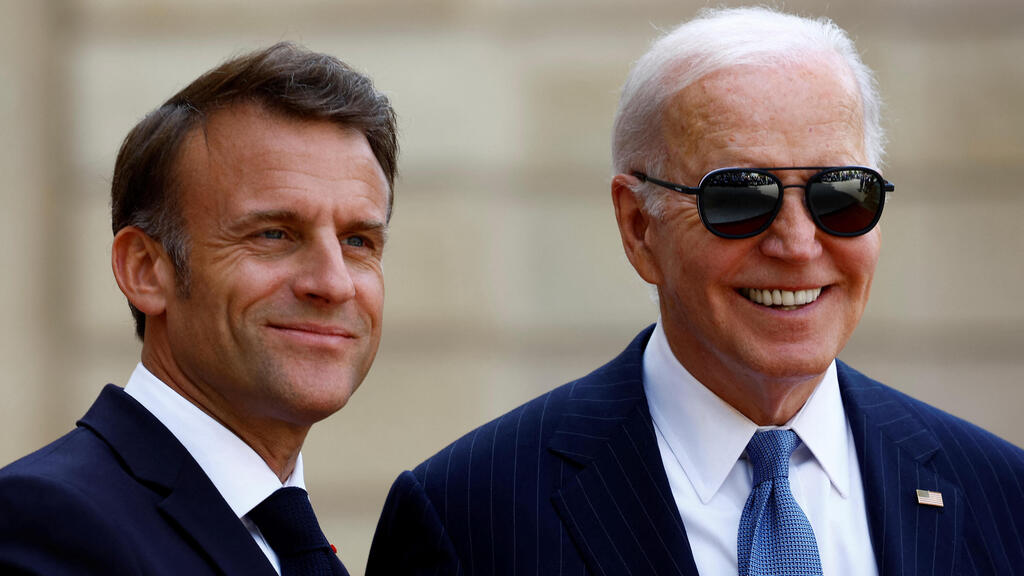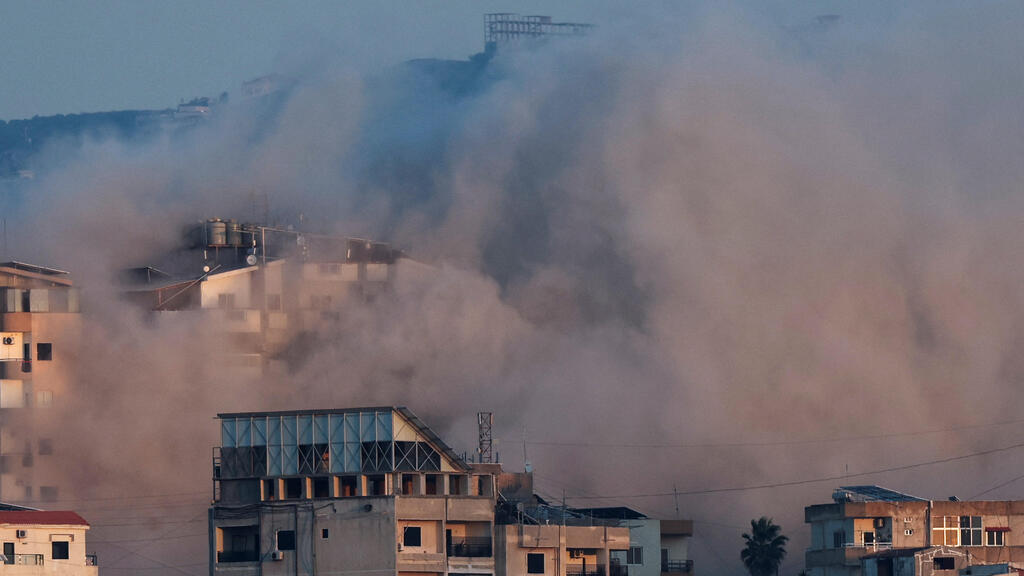U.S. President Joe Biden and French President Emmanuel Macron issued a joint statement overnight between Wednesday and Thursday calling for an immediate 21-day cease-fire between Israel and Hezbollah. ""It is time for a settlement on the Israel-Lebanon border that ensures safety and security to enable civilians to return to their homes," the statement reads. "We call on all parties, including the governments of Israel and Lebanon, to endorse the temporary cease-fire immediately." Senior White House officials hinted that Israel and Lebanon were familiar with the agreement, and even endorse it.
As of 3:30 p.m. on Wednesday, no rocket alert sirens were heard in the north. The IDF, meanwhile, continued its attacks in Lebanon.
2 View gallery


French President Emmanuel Macron and US President Joe Biden call for a 21-day cease-fire between Israel and Hezbollah
(Photo: Sarah Meyssonnier/Reuters)
"The exchange of fire since October 7th, and in particular over the past two weeks, threatens a much broader conflict, and harm to civilians," the statement continues. "We therefore have worked together in recent days on a joint call for a temporary ceasefire to give diplomacy a chance to succeed and avoid further escalations across the border."
The statement is endorsed by Australia, Canada, the European Union, Germany, Italy, Japan, Saudi Arabia, the United Arab Emirates and Qatar.
"The situation between Lebanon and Israel since October 8th, 2023 is intolerable and presents an unacceptable risk of a broader regional escalation. This is in nobody’s interest, neither of the people of Israel nor of the people of Lebanon," according to a statement signed by all of the countries. "It is time to conclude a diplomatic settlement that enables civilians on both sides of the border to return to their homes in safety. Diplomacy however cannot succeed amid an escalation of this conflict.
"Thus we call for an immediate 21 day cease-fire across the Lebanon-Israel border to provide space for diplomacy towards the conclusion of a diplomatic settlement consistent with UNSCR 1701, and the implementation of UNSCR 2735 regarding a cease-fire in Gaza," according to the statement.
It concludes: "We call on all parties, including the Governments of Israel and Lebanon, to endorse the temporary ceasefire immediately consistent with UNSCR 1701 during this period, and to give a real chance to a diplomatic settlement. We are then prepared to fully support all diplomatic efforts to conclude an agreement between Lebanon and Israel within this period, building on efforts over the last months, that ends this crisis altogether."
A senior White House official said that the statement was coordinated with the Israeli and Lebanese governments and that they could endorse it in the coming hours. "This is a breakthrough, we will try to use the time to make achievements on all fronts, including Gaza.," he said.
The official added that 21 days is a long enough period to allow practical contacts to reach a "very complex agreement. It's not some magic formula, but we thought it fit. We have held talks in recent months and we hope to use these 21 days to reach a permanent agreement that will allow citizens to return to their homes, that is the goal."
The cease-fire will be along the blue line dividing Lebanon from Israel approved by the UN in 2000 for the purpose of determining whether Israel had fully withdrawn from Lebanon; During the cease-fire the parties would discuss a comprehensive agreement that will allow civilians to return to their homes in both Israel and Lebanon, according to the official.
"This is a great effort that has been made during the last 48 hours. The president and his advisers have dealt with this with countries around the world. Lebanon and Israel have worked tirelessly to reach this moment and we value their cooperation," according to the official.
U.S. officials said Hezbollah would not be a signatory to the cease-fire but believed the Lebanese government would coordinate its acceptance with the group, and that once it is approved by LEbanon it would be understood that Hezbollah is involved. They said they expected Israel to “welcome” the proposal and perhaps formally accept it when Israeli Prime Minister Benjamin Netanyahu speaks at the General Assembly on Friday.
The White House said Wednesday night even before the joint statement, that Biden and Macron talked on the sidelines of the United Nations General Assembly in New York about efforts to reach a cease-fire in Lebanon to avoid a wider regional war.
Prime Minister Benjamin Netanyahu and his wife, Sara, leave for the United Nations General Assembly meetingi n New York early Thursday morning
(צילום: עומר מירון, יחזקאל קנדיל, לע"מ)
The joint statement comes after Israel's political-security cabinet convened Wednesday night for about four hours at the Kirya base in Tel Aviv, against the backdrop of the possibility that the IDF will soon enter into a ground war in Lebanon as part of the Northern Arrows operation . After the discussion ended, Prime Minister Benjamin Netanyahu flew to the United States where he will speak At the UN General Assembly in New York without providing a statement before take off.
The Pentagon said that it does not appear that the entry of IDF forces into Lebanon is likely to happen immediately despite the messages coming out of the IDF, and the Wall Street Journal cited sources familiar with the matter as saying that the IDF is not yet in a position to carry out a ground operation until it moves more soldiers to the north, but that the Pentagon believes that an Israeli ground operation could happen in the coming days. The IDF announced Wednesday afternoon that it will mobilize two reserve brigades of combined infantry and tanks for operational missions in the north.





